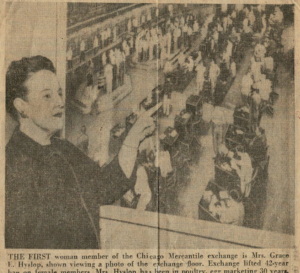 Grace Hyslop began her historic career in finance by working with chicken farmers and she never balked at a challenge.
Grace Hyslop began her historic career in finance by working with chicken farmers and she never balked at a challenge.
Hyslop, who graduated high school at age 12 and immediately accepted a job as a teacher in a one-room schoolhouse, became the first woman to hold a seat on the Chicago Mercantile Exchange. Later, in her 60s, she went to graduate school, earned a Master’s Degree in neuropsychology and began a fourth career working with people who had learning disabilities.
All those paths crossed in Nebraska where she raised six children and had a stock ticker installed in her home library.
She and her husband Mark launched their lucrative career in what is now known as derivatives by buying eggs and chickens from farmers and selling them to the military during World War II.
At that time, egg futures offered a way for people working in the poultry business to hedge their risk. Mark began commuting once a week to the Chicago Mercantile Exchange, where he and Grace’s efforts as market hedgers provided him an in to buy a seat on the exchange.
Meanwhile, Grace followed the action from their home, thanks to their home ticker.
As the family made plans to move to Chicago, Mark suffered a fatal heart attack. Rather than selling his CME membership, Grace applied for his seat. Although the board eventually granted her the seat, they did not allow her to walk the floor. She bought and sold contracts, but had to do it through an intermediary, eventually her son Mark.
They might not have wanted to see her on the floor, but exchange members were interested in using Grace in their marketing. A 1961 bulletin included this description of her, “The new member stated that she hopes to interest more women to trade in commodities handled on the C.M.E.” An additional report offered this assessment, “She has various women customers and feels that women are competent to trade commodities in terms of their business experience, financial resources, leisure and adequate time for study and attention to the markets.”